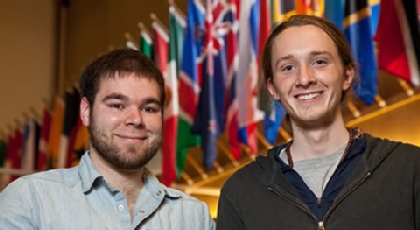Page 59 • (3,506 results in 0.06 seconds)
-
opportunities to inquire into the human condition and the natural world, opportunities for experiential learning, leadership and service, programs that support students physically, emotionally, ethically and intellectually. These programs also promote the university’s Integrative Learning Objectives and the university intent to educate the whole person – body, mind and spirit. In addition to a number of academically based co-curricular programs, many departments sponsor co-curricular education programs and
-
2017 Chemistry Capstone Symposium PLU Chemistry Department May 1st to May 5th, 2017 Chemistry Department Senior Capstone Presentations took place Monday through Friday, May 1-5,2017. The schedule of talks and abstracts is given below. [ Monday | Tuesday | Wednesday | Thursday | Friday ] Keynote Speaker: Curt Malloy, MPH, JD (and PLU ’88), Chief Operating Officer, Cancer Research and Biostastics (CRAB), Friday May, 4:30 pm. All talks were held in Morken Center for Learning and Technology (MCLT
-
2018 Chemistry Capstone Symposium PLU Chemistry Department April 30th to May 4th, 2018 Chemistry Department Senior Capstone The schedule of talks and abstracts is given below. [ Monday | Tuesday | Wednesday | Thursday | Friday ] Keynote Speaker: Eric Brauser, Ph.D. (and PLU ’10), TerraPower, LLC All talks will be held in Morken Center for Learning and Technology (MCLT), Room 103Monday, April 30th , 2018 (Morken Center for Learning and Technology, Room 103)1:40 pm - Welcome1:45 pm
-

live in a country that doesn’t really value bilingualism,” Davidson said. “They have distinct talents that we need to help support and develop.” Davidson designed the course series, now in its third year, as a hybrid between cultural studies and language learning. It offers bilingual students the rare opportunity to develop both languages simultaneously and in community. It also aims to destigmatize the use of so-called “slang,” or less formal ways of speaking. “It’s not seeing them as a population
-
individual or group may hold. Explicit Bias is conscious and intentional bias expressed through language or gesture and intended to insult and demean another person. Implicit Bias exists “outside the level of awareness because [it is] deeply embedded in the psyche and made invisible” (Sue, 2010). While implicit bias may not be grounded in intention, the impact of the bias still exists for the individuals or groups who experience its effect. Both forms of bias also can take the form of on-going
-

Meyer – English teaching assistant in South Africa Meyer will be working with university students on conversational English, reading and writing in South Africa. “The position was especially appealing to me because I have an endorsement in teaching English Language Learners (ELL),” she said. “Most of my experience is with elementary school students, but I am excited to tutor and also learn from the adults I will be working with at the university.” Originally from Spokane, Wash, she graduated last
-

with family and academic advisors before deciding to pursue a biology major that would lead her to becoming a doctor. For Ash, this felt like the right fit. “I’ve always been attracted to the sciences – especially those that have to do with the human body,” she says. Because Pacific Lutheran University expands learning beyond concentrations, Ash enrolled in biology classes she normally wouldn’t take. She enrolled in Land Management and Conservation Biology, which she says broadened her view. “It
-

, quality preschool,” she says. “We provide services for the whole child.” That includes social, emotional, cognitive, physical and language learning, as well as physical activities and nutrition. During her PLU days, Ferguson didn’t know she would find her life’s work in education. She majored in sociology and psychology and, after graduation, went to work for Safe Streets in Tacoma, whose mission is building strong neighborhoods. “I was a community mobilizer for Safe Streets,” Ferguson recalls. She
-
Testing in the School of Nursing is a high-stakes process for students, an essential component of student learning, and a formal component of program curriculum. Testing is one essential method of assessing student learning, program outcomes, and program quality. As such it must be managed with purpose, integrity, consistency across the curriculum, and accountability for the education we provide. Testing also provides feedback to the students, which is particularly important in their mastery of
-
teaching English with an emphasis on Leadership and Life Skills in addition to augmenting her own Spanish language skills and intercultural competency. Follow her adventures, learning, and struggles on her blog! Updated June 2019 The Journey Continues Danae McGaha, ’16, an alum of study away programs in London and Copenhagen, is continuing her global education in her post-graduation life by teaching English in Budapest, Hungary! To follow along on her journey and find out more information about making
Do you have any feedback for us? If so, feel free to use our Feedback Form.


